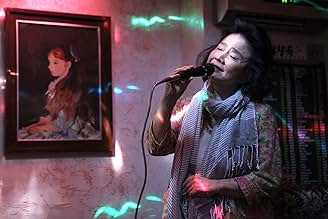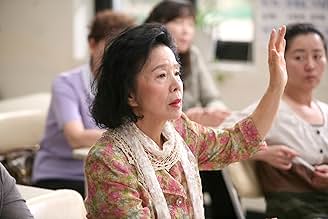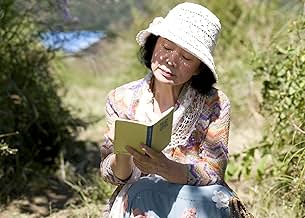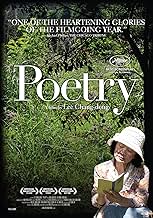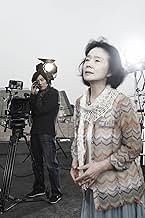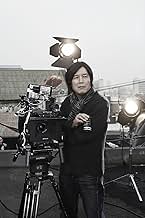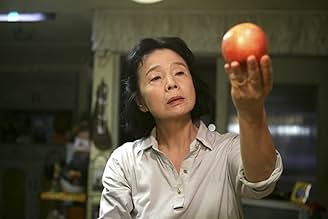VALUTAZIONE IMDb
7,8/10
14.330
LA TUA VALUTAZIONE
Una donna sulla sessantina, di fronte alla scoperta di un atroce crimine familiare e nelle prime fasi del morbo di Alzheimer, trova forza e scopo quando si iscrive a un corso di poesia.Una donna sulla sessantina, di fronte alla scoperta di un atroce crimine familiare e nelle prime fasi del morbo di Alzheimer, trova forza e scopo quando si iscrive a un corso di poesia.Una donna sulla sessantina, di fronte alla scoperta di un atroce crimine familiare e nelle prime fasi del morbo di Alzheimer, trova forza e scopo quando si iscrive a un corso di poesia.
- Regia
- Sceneggiatura
- Star
- Premi
- 27 vittorie e 25 candidature totali
Recensioni in evidenza
Reading Poetry's summary, one sees a sentimental film. I surely wasn't sure if I wanted to see this or not. I am completely happy I did.
What we have here is a slow-paced, delicate film. But it doesn't sway in sentimentality. It's subtle, quiet, and perhaps the most gentle film of the year, but it also wallows in the study of a suburban woman and in many ways feels like a dark portrait of a story. Yoon Jeong-hee is magnificent! She conveys so much emotion, and we realize just how quickly we want to see her journey here. The direction is assured, quitely letting us explore, never calling attention to itself. The screenplay is brilliant, and has the ideal arc needed for a film like this.
There are many amazing moments in this film, moments that really grabbed me and that emotionally shook me. One of the best films of the year in an already amazing year for film.
What we have here is a slow-paced, delicate film. But it doesn't sway in sentimentality. It's subtle, quiet, and perhaps the most gentle film of the year, but it also wallows in the study of a suburban woman and in many ways feels like a dark portrait of a story. Yoon Jeong-hee is magnificent! She conveys so much emotion, and we realize just how quickly we want to see her journey here. The direction is assured, quitely letting us explore, never calling attention to itself. The screenplay is brilliant, and has the ideal arc needed for a film like this.
There are many amazing moments in this film, moments that really grabbed me and that emotionally shook me. One of the best films of the year in an already amazing year for film.
The theme of old age and illness find a new positive essence in poetry. A device to have even the elderly explore life in new and interesting ways. The excellent screenplay and brilliant directing from Chang-Dong Lee combined with an engaged ensemble cast and revealing cinematography, give place for an intimate interaction. The poets and aspiring poets fit well in this story of inner discovery. The inspiration is difficult to come by and external events will accentuate the duality of seeing life as an observer while also being an essential actor.
The multi-layered story has poetry, dialogue, imagery and much time for reflection. The film builds up to the last poem "Agnes' Song" by Mija Yang (the protagonist) which is powerful and perfect. Accentuated by it's accompanying images, it brings out life, beauty, sadness, acceptance, connection and so much more. The editing is especially effective here, but is extraordinary throughout. The ending confirms that the collections of individually intense and intelligent scenes witnessed transcends by transposing and transforming Mija and ultimately the viewer.
Hopefully this will inspire a perhaps much needed poetic view of this hypermodern world which can barely watch deliberate thoughtful meaningful measured movies like this, much less find and read a poem. Maybe this artistic beckon will even encourage someone to write one.
The multi-layered story has poetry, dialogue, imagery and much time for reflection. The film builds up to the last poem "Agnes' Song" by Mija Yang (the protagonist) which is powerful and perfect. Accentuated by it's accompanying images, it brings out life, beauty, sadness, acceptance, connection and so much more. The editing is especially effective here, but is extraordinary throughout. The ending confirms that the collections of individually intense and intelligent scenes witnessed transcends by transposing and transforming Mija and ultimately the viewer.
Hopefully this will inspire a perhaps much needed poetic view of this hypermodern world which can barely watch deliberate thoughtful meaningful measured movies like this, much less find and read a poem. Maybe this artistic beckon will even encourage someone to write one.
What a contrast to the average Hollywood product which highlights guns afire, frantic car chases and exploding buildings--noise and action aplenty: this subtle and enticing tale of self-realization is the antithesis of the action film, although within the first few minutes of the film, in the midst of children playing near a river, a body floats by and sets an odd tone for the remainder of the film. A grandmother who learns she has an incurable illness and who discovers her grandson is not merely a disaffected teen who cannot clean up after himself--but something worse-- the woman inexplicably enrolls in a poetry class and for the next two hours we are taken along her journey in a most leisurely fashion, a film with powerful cinematography and at last, a puzzling, thoughtful conclusion: if you want easy entertainment with pat answers, this is not your film. If you enjoy an immersion in another culture from another point of view, this might be a great treat for you--it was for me
What a wonderful film! To give my personal answer to one interviewer's question "Do you regard cinema, too, to be a dying form?" to the director Lee Chang-Dong. I believe (and deeply hope) that as long as films like Poetry are being made cinema will continue to flourish because it is important. It will continue to exist as long as humans exist because they are about being human. I was struck by how masterfully two sides of our humanness were presented in the film. On the one hand, it is about our search for beauty, as beauty can only be experienced if something of our own potential beauty responds to the beauty around us. There is something spiritual in this as Beauty and Truth are essentially one. On the other hand, there is the human predicament. That includes the pro and cons of the fact that we always have the choice to decide if we act ethically or not. That means if we actually say Yes to what is intrinsically our positive potential, or we say No and harm others, our environment and as a kind of end result, ourselves. What for me links the two is impermanence. Old age, illness and suicide as it is shown in the film. "Everything that is born will have to die" goes a very old Buddhist saying, and that happens no matter if we like it or not. At the same time, would we experience beauty if everything was to exist forever? Is it not because a beautiful flower grows out of a very simple looking seed in spring and then withers away after some weeks that it can become so precious to us? Without impermanence there is, one could say, by definition no beauty. Both are somehow the two sides of the same metaphorical coin. The same is true about this film. It still lingers on in my heart and mind weeks after I saw it. Very much like a true and wonderful poem, for example Rainer Maria Rilke's First Duino Elegy. It is is just about that, the wonder and horror of beauty.
As a lover of World Cinema and having had a few poems of my own published here and there, South Korea's 'Poetry' was always going to be a double treat for me.
The film's beauty is that it's not just about poetry but how that it can fit into everyday lives and help folk the see the inner beauty that it brings. Mija (an excellent Jeong-he Yun) a 66 year old woman, suffering the onset of Alzheimers, sees the simple beauty in an apple and of fallen apricots on the ground.
She gets this after starting poetry classes and whilst she fails to get her 'poetic awakening', she sets herself the target of writing just one poem.
Considering that this gentle, graceful lady is bringing up a teenage grandson who has committed a serious crime and as a job cares part-time for an elderly stroke victim these poetical leanings are a soothing diversion for both us - and her. (She's not bad at badminton, either!) It's actually the way the film contrasts several issues, the modern contemporary ones that give the film its backbone, the age difference clashes with the grandson and the lyrical - but unsentimental - softer side and you get a modest and modern masterpiece.
Avoid if only Iron Man 2 can move you. But if you have a heart, one where a soul and emotion can flourish and you enjoy a well acted, straightforward modern film - wherever in the world that it might come from - then 'Poetry' has a wide and worthwhile appeal.
The film's beauty is that it's not just about poetry but how that it can fit into everyday lives and help folk the see the inner beauty that it brings. Mija (an excellent Jeong-he Yun) a 66 year old woman, suffering the onset of Alzheimers, sees the simple beauty in an apple and of fallen apricots on the ground.
She gets this after starting poetry classes and whilst she fails to get her 'poetic awakening', she sets herself the target of writing just one poem.
Considering that this gentle, graceful lady is bringing up a teenage grandson who has committed a serious crime and as a job cares part-time for an elderly stroke victim these poetical leanings are a soothing diversion for both us - and her. (She's not bad at badminton, either!) It's actually the way the film contrasts several issues, the modern contemporary ones that give the film its backbone, the age difference clashes with the grandson and the lyrical - but unsentimental - softer side and you get a modest and modern masterpiece.
Avoid if only Iron Man 2 can move you. But if you have a heart, one where a soul and emotion can flourish and you enjoy a well acted, straightforward modern film - wherever in the world that it might come from - then 'Poetry' has a wide and worthwhile appeal.
Lo sapevi?
- QuizThe idea for the film had its origin in a real-life case where a small town schoolgirl had been raped by a gang of teenage boys. When director Lee Chang-dong heard about the incident, it made an impact on him, although he hadn't been interested in basing a film on the actual events. Later, during a visit in Japan, Lee saw a television program in his hotel room. The program was edited entirely from relaxing shots of nature, "a peaceful river, birds flying, fishermen on the sea with soft new-age music in the background," and a vision for a possible feature film started to form. "Suddenly, it reminded me of that horrible incident, and the word 'poetry' and the image of a 60-year old woman came up in my mind."
- ConnessioniFeatured in At the Movies: Cannes Film Festival 2010 (2010)
I più visti
Accedi per valutare e creare un elenco di titoli salvati per ottenere consigli personalizzati
- How long is Poetry?Powered by Alexa
Dettagli
Botteghino
- Budget
- 1.300.000.000 KRW (previsto)
- Lordo Stati Uniti e Canada
- 356.149 USD
- Fine settimana di apertura Stati Uniti e Canada
- 18.900 USD
- 13 feb 2011
- Lordo in tutto il mondo
- 2.539.040 USD
- Tempo di esecuzione2 ore 19 minuti
- Colore
- Mix di suoni
- Proporzioni
- 1.85 : 1
Contribuisci a questa pagina
Suggerisci una modifica o aggiungi i contenuti mancanti


